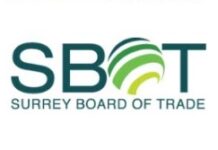
IN spring, secondary students from schools across Surrey positioned themselves for summer self-employment with an experiential learning program called Project Enterprise. Participating students were challenged to create their own business models and implement real social enterprises that have a triple bottom line of people, planet and profits.
“Helping young people develop an entrepreneurial mindset is a priority for the Surrey Board of Trade,” said Surrey Board of Trade CEO, Anita Huberman. “We have been able to offer Project Enterprise to Surrey schools, thanks in part to the generous support of Coast Capital Savings. Their funding has enabled us to help local students discover that they have the power to be change makers in their own community.”
Educators expressed initial interest in this project because they wanted to provide a real-world learning experience that helped students develop entrepreneurial skills. Many had observed that their students had little or no experience in this area and felt that the opportunity for them to collaborate with their peers in developing a real business venture would be very valuable. Teachers successfully integrated the program into a variety of different courses, including marketing, entrepreneurship, accounting, planning and business.
Participating teachers reported being impressed with students’ level of engagement. Raman Bedi of École Panorama Ridge noted that his Career Transitions students were fully engaged and had lots of fun with the process. “Given that the students were trying business ideas for the first time, there were some learning curves that they had to overcome,” said Bedi. “Students felt very rewarded at the end and the experience gave them the confidence to potentially continue their business ideas.”
Huberman reports that the program helps students develop competencies that are relevant to the new economy. All participating teachers agreed and stated specifically that Project Enterprise successfully helped their students develop practical life skills such as organization and planning, communications, critical thinking and problem-solving, and collaboration and teamwork.
Perhaps the most exciting outcome was the way the program inspired students to impact their communities by aligning their products with a charitable cause. For example, one student team at Panorama Ridge developed a line of greeting cards featuring positive statements around body image. Bedi was impressed when this group donated 100% of their profits to the nonprofit organization I Am That Girl.
Reflecting on her experience at the end of the program, one participant advised other youth entrepreneurs to center their products around something they wholeheartedly cared about. She summarized her learning with these thoughts: “Entrepreneurship is about making a difference. It’s about bringing innovation to the world and following through to see your impact being made.”











